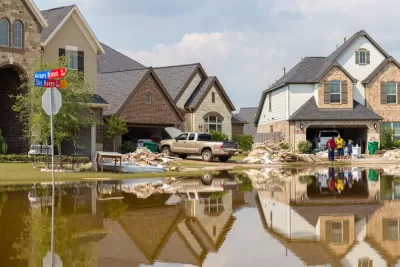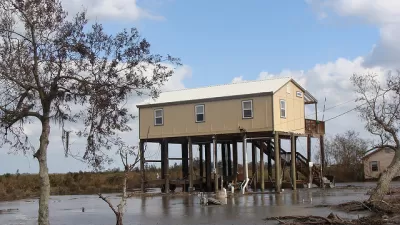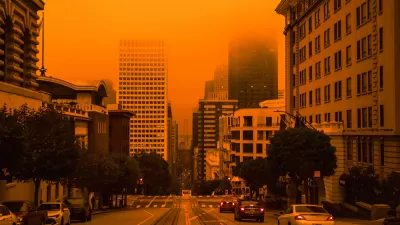Americans are fleeing the effects of climate change by the millions. Expect the number of climate refugees to continue to grow.

With the West on fire and hurricane season sending repeated blows to the coastal United States, a pair of recent articles have explored the already reality of residents permanently fleeing their homes to escape the worst of climate change.
"The fires will eventually end, but for many residents of the region, the disaster is just beginning," writes Joel Mathis for The Week. "The climate refugee crisis has come to America."
Americans aren't used to thinking of crises in the United States in terms of refugees, but the data to back up the narrative is already conspicuous. Mathis writes:
In fact, climate migration was already well underway in the United States before the latest round of fires. The Urban Institute estimates more than 1.2 million Americans left their homes in 2018 for climate-related reasons — some were escaping long-term problems, but others were fleeing short-term disasters that became permanent displacements. Sea level rise could force millions more coastal residents to move in coming years. People won't keep living in places where it is impossible to live. Sooner or later they will choose — or be forced — to leave their homes and find somewhere safer.
A separate article by Tim McDonnell, published by Quartz earlier in the month, focuses specifically on the challenges facing residents of coastal communities in Louisiana, and the communities that have grown with climate refugees, not just the communities being gutted by population loss. In St. Tammany parish, the city has been completely transformed by the steady stream of new residents since Hurricane Katrina. "That growth has not waned. St. Tammany is now one of the fastest-growing parishes in the state. Its population has quadrupled since 1970, to a quarter million, and is expected to double by 2030," writes McDonnell.
FULL STORY: The climate refugees are here. They're Americans.

Planetizen Federal Action Tracker
A weekly monitor of how Trump’s orders and actions are impacting planners and planning in America.

Congressman Proposes Bill to Rename DC Metro “Trump Train”
The Make Autorail Great Again Act would withhold federal funding to the system until the Washington Metropolitan Area Transit Authority (WMATA), rebrands as the Washington Metropolitan Authority for Greater Access (WMAGA).

The Simple Legislative Tool Transforming Vacant Downtowns
In California, Michigan and Georgia, an easy win is bringing dollars — and delight — back to city centers.

The States Losing Rural Delivery Rooms at an Alarming Pace
In some states, as few as 9% of rural hospitals still deliver babies. As a result, rising pre-term births, no adequate pre-term care and "harrowing" close calls are a growing reality.

The Small South Asian Republic Going all in on EVs
Thanks to one simple policy change less than five years ago, 65% of new cars in this Himalayan country are now electric.

DC Backpedals on Bike Lane Protection, Swaps Barriers for Paint
Citing aesthetic concerns, the city is removing the concrete barriers and flexposts that once separated Arizona Avenue cyclists from motor vehicles.
Urban Design for Planners 1: Software Tools
This six-course series explores essential urban design concepts using open source software and equips planners with the tools they need to participate fully in the urban design process.
Planning for Universal Design
Learn the tools for implementing Universal Design in planning regulations.
Smith Gee Studio
City of Charlotte
City of Camden Redevelopment Agency
City of Astoria
Transportation Research & Education Center (TREC) at Portland State University
US High Speed Rail Association
City of Camden Redevelopment Agency
Municipality of Princeton (NJ)





























